It seems we can’t find what you’re looking for. Perhaps searching can help.


Tag: hydrogen




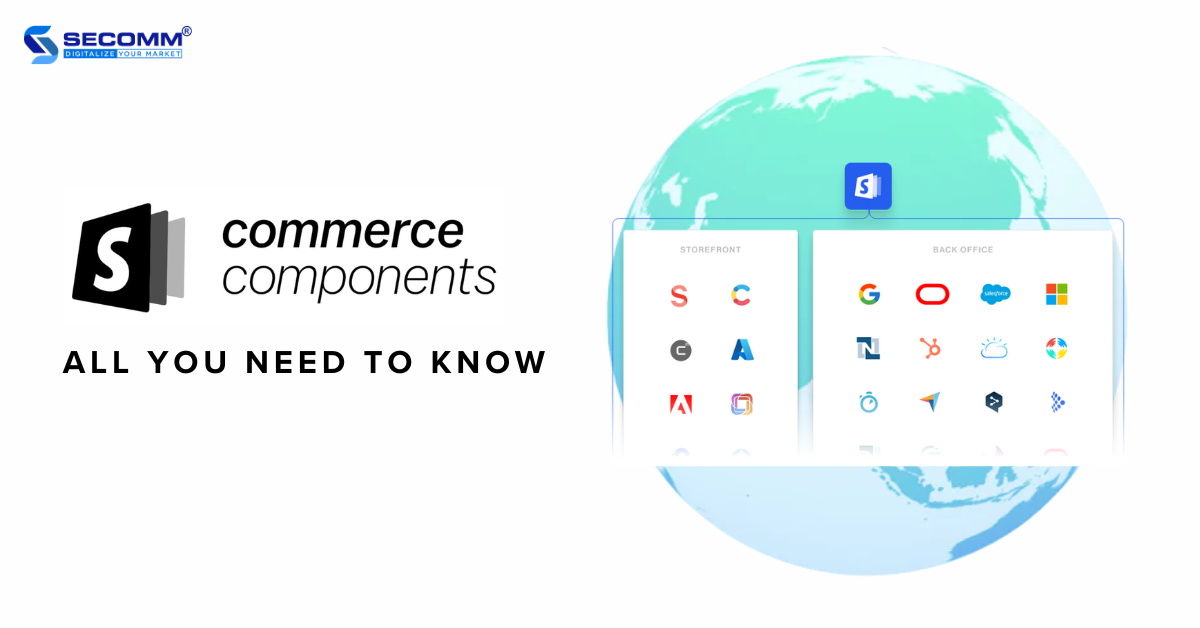
SHOPIFY COMMERCE COMPONENTS: ALL YOU NEED TO KNOW IN 2024
Today, with the growing demand for flexible and scalable eCommerce system development, large-sized businesses turn their attention to solutions like Headless, Microservices, and Composable Commerce. The Composable approach will allow you to integrate independent components to tailor and enhance the eCommerce experience.
Knowing this insight, Shopify has unveiled the Commerce Components solution, offering you — as a large-sized business — the most straightforward approach to deploying Composable Commerce.
Learn more: What is Composable Commerce?
What are Commerce Components?
Commerce Components is an innovative tech stack designed for large businesses. Rather than introducing new features, the company has transformed its infrastructure into modular components that can be combined to build and customize adaptable eCommerce websites. This means you can select components based on your deployment needs and seamlessly integrate them into your existing tech stack using flexible and unlimited API connections, ensuring a smooth customer experience across all devices.
“We’ve always approached innovation by anticipating what retailers need and then providing those solutions,” said Harley Finkelstein, president of Shopify. “Commerce Components opens our infrastructure so enterprise retailers don’t have to waste time, engineering power and money building critical foundations it has already perfected, and instead frees them up to customize, differentiate and scale”
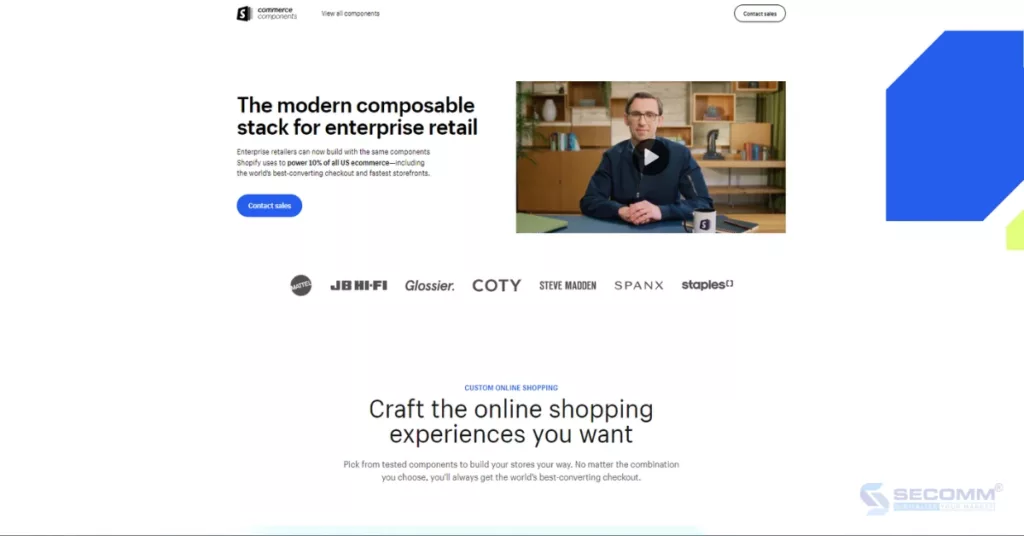
Commerce Components by Category
The solution offers six main categories including over 30 components, allowing you to build a tailored solution that aligns with your needs.
- Storefront: Build custom storefronts using any framework, API, and hosting.
- Cart & Checkout: Optimize the shopping cart and checkout process using APIs and additional utilities.
- Core Commerce: Create products with various data models through APIs.
- Data & Compliance: Provide solutions for leveraging customer insights to boost sales while managing and securing customer privacy data.
- Shipping & Logistics: Offer OMS and IMS solutions to streamline logistics processes.
- Omnichannel: Manage and sell across multiple channels, from POS and eCommerce platforms to social media and chat applications.
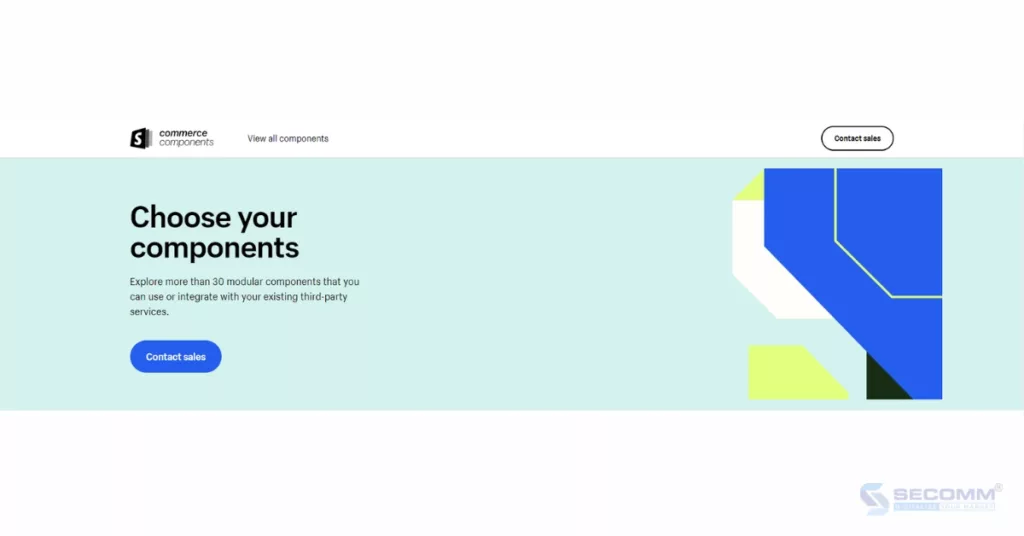
What is the difference between Commerce Components and Shopify Plus?
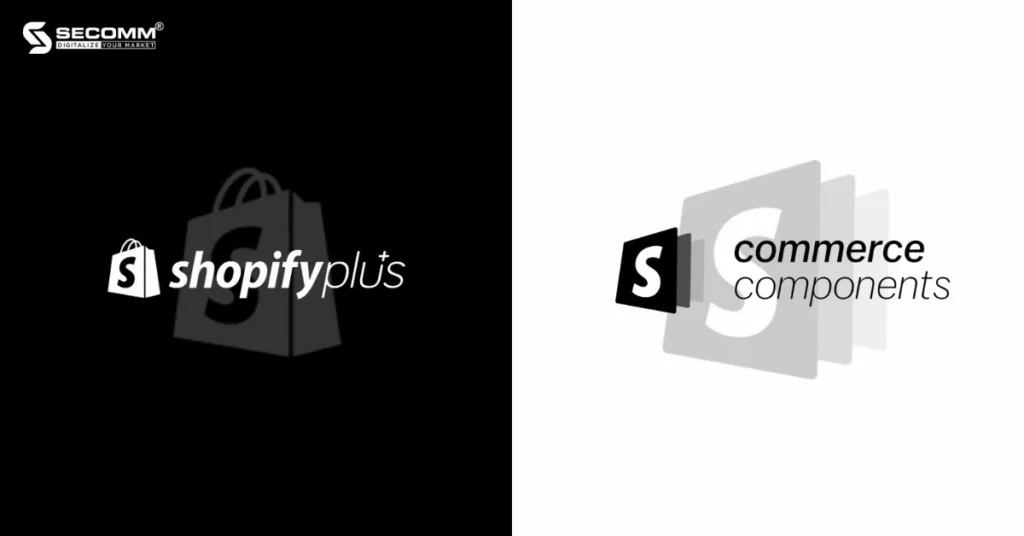
Although both ‘Plus’ and Components are enterprise eCommerce solutions, they differ in several aspects:
- Operations: ‘Plus’ is an all-in-one eCommerce platform, providing numerous advanced features and seamless integrations with third parties. On the other hand, the new tech stack is a collection of components for you to integrate into your existing technology stack, aiming to create and deliver a customized and seamless experience for customers.
- License fee: While ‘Plus’ charges a platform fee starting at $2000 per month, along with transaction and credit card fees, Components charges based on the level of usage of the components, with fees decreasing as more components are utilized.
- Features: ‘Plus’ offers many features and regularly provides updates and feature enhancements, with the latest being Shopify Edition ’23. In contrast, Components, as a new tech stack, provides unlimited API connections, increased product attribute limits, integration with new third-party technology solutions, and enhanced transaction processing capability of up to 40,000 payments per minute per store.
- Customer support: ‘Plus’ businesses can seek guidance and support during deployment through the Merchant Success Program. Components, on the other hand, provides businesses with access to Shopify Professional Services.
Benefits of using Commerce Components
- Flexible Modular Architecture
If you don’t prefer to deploy pre-packaged eCommerce platforms. Composable architecture is the ideal choice. It allows you to select and purchase components based on your needs, integrate them into your existing systems, and customize them.
With its modular architecture, the tech stack provides unlimited API connections, meaning there is no limit to the number of components and add-ons that you can use to build your tech stack.
Moreover, since components are entirely independent, you can add, remove, and modify components without affecting the entire system.
- Cost Optimization
Commerce Components employs a pricing model structured around the level and quantity of components used. This means you only pay for the components you require. Furthermore, as you acquire and utilize more components, you’ll benefit from increasingly significant discounts.
Additionally, the annual payment structure of Components helps you facilitate precise cost predictions.
Brands using Commerce Components
Since its inception, the platform has proudly highlighted the trust and adoption of its solution by major global businesses. Notable among these are Glossier, JB Hi-Fi, Coty, Steve Madden, Spanx, and Staples.
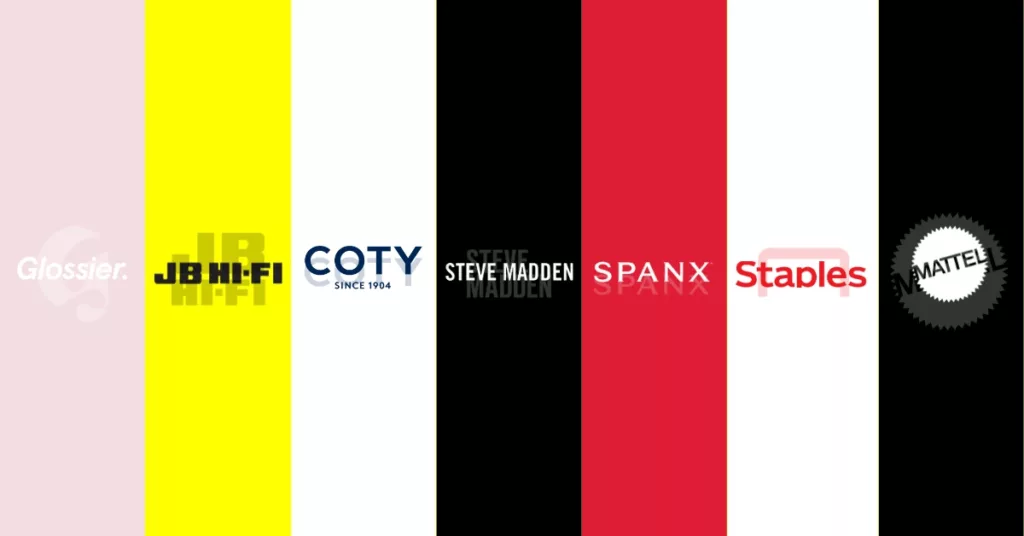
Leading U.S. toy brand Mattel is one of the first enterprises to successfully implement this technology solution. Sven Gerjets, Mattel’s CTO, said in a statement.
“We first worked with Shopify on a project called Mattel Creations, a platform for creators to reimagine the most iconic toys in the world. Creations empowered Mattel to move quickly, meet our customers where they are, and most importantly leverage its infrastructure to scale globally. It was hugely successful, and we’re excited to transform our brand offerings using Commerce Components.”
The trust placed by Mattel and other industry leaders forms a solid basis for expecting the ongoing success of this new solution, extending its impact not only within the U.S. market but also on a global scale.
Final Thoughts
In the past, large businesses often favored open-source platforms like Magento or Salesforce due to their customizable and flexible expansion capabilities. However, in today’s landscape, SaaS platforms, particularly Shopify, offer innovative solutions for developing Composable or Headless Commerce.
In 2021, the company launched the Hydrogen + Oxygen solution to enhance Headless Commerce development. Continuing this trend into early 2023, they once again surprise the industry with Commerce Components, designed for deploying Composable Commerce.
This move highlights its commitment to anticipating and responding to customer needs, earning the trust of large enterprises in the face of competitive rivals.
Reach out or call the SECOMM hotline at 028 7108 9908 for a more in-depth understanding of Commerce Components by Shopify and to explore the implementation of Headless Commerce or Composable Commerce.
 2
2

 8,433
8,433

 0
0

 1
1
